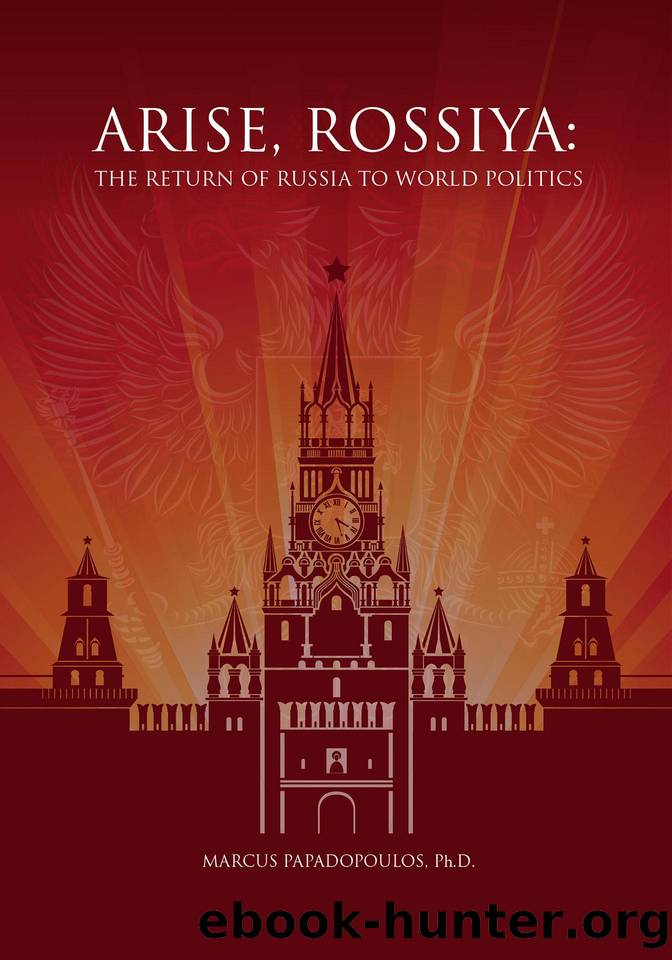Arise, Rossiya-The Return of Russia to World Politics by Marcus Papadopoulos

Author:Marcus Papadopoulos
Language: eng
Format: mobi, epub
Published: 0101-01-01T00:00:00+00:00
Chapter 4: Eyes on Soviet-era Friends
The Cold War period marked an unprecedented height for Moscow's influence in international affairs. During the course of four decades, from 1947 until 1991, the Soviet Union projected its power to most of the world's continents and, in doing so, comfortably surpassed the Russian Empire's leverage in world affairs, which had chiefly been centred upon the Balkans. Whereas under the Tsars, Moscow's appeal to people outside of Russia's borders had been confined to pan-Slavism and the Orthodox faith, which, needless to say, was limited in its attraction, and finite even amongst Slavs and Orthodox adherents, the Bolsheviks offered something which appealed to people regardless of where they resided in the world and irrespective of their ethnic and religious composition: homes and jobs for life, and free education and healthcare; the fundamentals in life - security and stability.
Soviet communism's appeal resulted in the Kremlin building inroads in culturally diverse countries and ones which had never previously experienced close relations with a Russian state. And it was the Soviet influence in those countries, many, of whom, were of immense geo-strategic importance, which heralded the USSR not as a great power but as a superpower whose reach extended across the globe and which, in turn, enabled the Bolsheviks not only to limit American, and also British, expansionism but, on occasions, to vanquish it, too.
While the argument can be legitimately made that the Soviet economy had not been in a position, in the long-term, to subsidise so many countries in the world, from North America to Latin America to Europe to Africa and to Asia, the very fact that the centrally-planned economy had been able, in the very first place, to do this - and to do so for such a lengthy period of time - is an actuality which must be taken into consideration. Furthermore, that the Soviet economy had, arguably, been the second most successful economy in the world for much of the Cold War, allowed Moscow to develop tentacles which extended across the world and, in doing so, helped strengthen the Soviet Union and safeguard the Soviet Motherland from American aggression.
Putin and his inner circle are exceedingly conscious of how the Soviet Union was able to contain American expansionism on the international stage, and strengthen the Soviet state in the process, through developing close political, economic and military relations with countries across the world. Today, the Russian Federation, like its Soviet predecessor, is faced with an American threat, albeit one which has grown more powerful and thereby more dangerous since the dissolution of the USSR. And Russia's leaders today understand that projecting Russian power abroad is dependent on Russian economic prowess. With the Russian economy having become, under Putin, one of the largest and most robust in the world, which survived both the global financial crash of 2008 and Western sanctions imposed on it during the Ukraine crisis, the Kremlin has begun resurrecting ties with Soviet-era friends which, during the Cold War, helped Moscow attain an international presence which no Russian state had previously enjoyed.
Download
Arise, Rossiya-The Return of Russia to World Politics by Marcus Papadopoulos.epub
This site does not store any files on its server. We only index and link to content provided by other sites. Please contact the content providers to delete copyright contents if any and email us, we'll remove relevant links or contents immediately.
Guns, Germs and Steel by Diamond Jared(2353)
Collapse: How Societies Choose to Fail or Succeed by Jared Diamond(1502)
The Emperor of All Maladies by Siddhartha Mukherjee(1428)
Transcendence by Gaia Vince(1136)
148424513X by Unknown(1077)
Seven Skeletons by Lydia Pyne(1060)
Civilization One by Christopher Knight(1000)
Sapiens - A brief history of humankind (Marathi) by Yuval Noah Harari(986)
The Rational Optimist: How Prosperity Evolves by Matt Ridley(962)
THE MASTER AND HIS EMISSARY by Iain McGilchrist(927)
Guns, Germs, and Steel: The Fates of Human Societies by Jared M. Diamond(923)
At Home by Bill Bryson(906)
Underworld The Mysterious Origins of Civilization by Graham Hancock(889)
Marco Polo by Laurence Bergreen(889)
How the Irish Saved Civilization by Thomas Cahill(884)
Atrocitology by Matthew White(875)
Ancient Iraq by Georges Roux(853)
The World Until Yesterday: What Can We Learn From Traditional Societies? by Jared Diamond(845)
Guns, Germs and Steel: The Fates of Human Societies by Jared Diamond(841)
